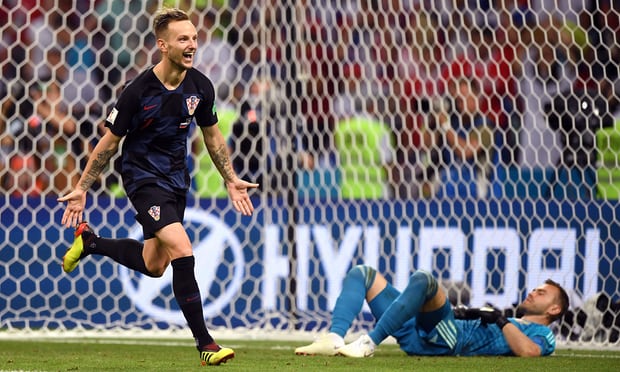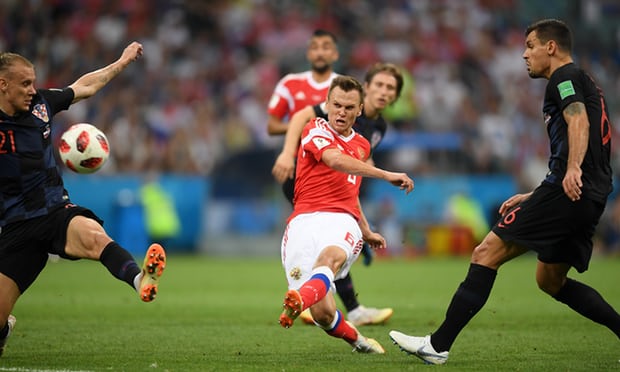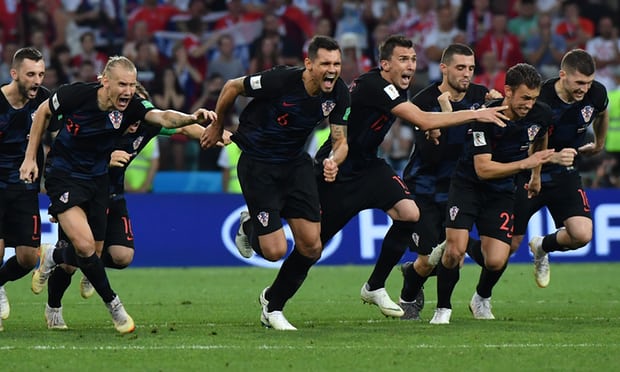Croatia thought they had won this World Cup quarter-final epic before they actually did. Domagoj Vida will not rate his extra-time header as the most powerful of his career but it was surely the most precious.
When he connected with Luka Modric’s corner, the ball had a long way to travel. It got there in the end. The substitute Vedran Corluka had a nibble after it had bounced while another replacement, Russia’s Fedor Smolov, was on the scene. The upshot was that the goalkeeper, Igor Akinfeev, saw it late and it squeezed into the far corner.
Game over? Not at all. Russia had other ideas. This team, written off before the start of the tournament, do not know when they are beaten and the scenes that greeted Mário Fernandes’s late equaliser were astonishing.
After the right-back had directed his free header past Danijel Subasic, there was the explosion of noise and all of Russia’s substitutes sprinted over to celebrate with him behind the goal. The drama was unremitting and it crackled throughout the penalty shootout.
Both of these nations had gone through the drama from 12 yards in the last 16. They had been through the mill only days previously.
It was Croatia who held their nerve and when Ivan Rakitic – just as he had done against Denmark – rolled home the winning kick, their joy knew no bounds. At last, they have emulated the glory boys from France 98, who reached the semi-finals, and it is they who will meet England in the last four on Wednesday.

Poor Russia. They gave everything in a performance of intensity and no little offensive intent but this time, the shootout gods were against them. Their villains were the substitute Smolov and, cruelly, Fernandes. At least, this country will have fond memories of a heroic run.
Croatia believed they had the superior quality, that it was up to them to set the tone and it was certainly a statement of intent from the manager, Zlatko Dalic, to leave out the defensive midfielder Marcelo Brozovic and start with an extra attacking player, Andrej Kramaric. Dalic’s two central midfielders were Luka Modric and Ivan Rakitic. The lineup was as close to all-out attack as could have been imagined.
Yet Russia did not start like the team that had bolted the door against Spain in the last 16. Far from it. As expected, Stanislav Cherchesov had reverted to a back four but what was surprising was how Aleksandr Golovin, the No 10, was asked to push up like a second striker at times. Russia pressed high, with Artem Dzyuba, the muscular centre-forward, a focal point and battering ram. The energy crackled. It was remarkable to see the home nation’s slickness and directness. Croatia looked a little spooked in the opening minutes and they endured a couple of wobbles, one of which featured a loose clearing header from Sime Vrsaljko. Dzyuba sized up the volley only for Dejan Lovren to block.
It was an action-packed opening and, if the atmosphere did not begin at fever pitch, it nonetheless pulsed. Weirdly, amid the intensity, the home support sent a Mexican wave rippling around the ground on 15 minutes. It was fired by pure exuberance.

By then, Croatia might have been ahead. Ante Rebic, the powerful winger, won possession on the byline and then a corner. From it, he rose to meet Lovren’s flick and it really was a free header. He sent it high. Croatia would lament a better opportunity on 11 minutes. Vrsaljko crossed low and Mario Mandzukic, having found space, fluffed the finish.
Denis Cheryshev has seemingly come from nowhere at this World Cup. A late inclusion in Cherchesov’s squad, he was pressed into the lineup when Alan Dzagoev injured his hamstring in the opening tie against Saudi Arabia. Everybody knows him now and he illuminated this tie with a beautiful opening goal. Cheryshev picked up possession, evaded Rakitic and swapped passes with Dzyuba before surging on. Modric jumped into a slide tackle but Cheryshev slalomed away from him and, from a position to the left of centre, 25 yards out, he unfurled a left-foot curler that began its journey outside Danijel Subasic’s right-hand post. It would whip back inside it and the home crowd could revel in another pinch-me moment. Subasic did not even dive.
Croatia were rattled. Lovren and Ivan Strinic collected yellow cards. Yet they found the equaliser before the interval, which felt like a case of perfect timing. The move started when Mário Fernandes, the Russia right-back, committed to a header upfield and did not win it. His team were stretched, with Ilya Kutepov, the right centre-half, forced to come across.
Dalic’s team worked the ball smartly up the flank, from Strinic to Ivan Perisic to Mandzukic and, when he crossed, Kramaric arrived to guide a header past Igor Akinfeev. Briefly, there was the sound of silence. Croatia had wanted control in midfield and it proved elusive in the first half but they began to get it after the interval. They stroked the ball this way and that, probing for the opening, and Modric’s influence grew, although clear-cut chances would prove difficult to come by.
Cherchesov had urged the crowd after Kramaric’s equaliser to keep the noise levels up, which they did, and it became a gripping spectacle. As Croatia pushed, the home support chanted their team’s name. They tried to keep their opponents out through sheer force of will. Croatia advertised the next goal and only the width of an upright denied them. The chance was presented on the hour when two red shirts challenged each other following Kramaric’s cross and when the ball broke to Perisic he shot against the inside of the far post. It would fizz across goal and away.
Dalic introduced Brozovic for Perisic in a bid to tighten the grip on midfield, which released Modric and Rakitic to play a little higher, but Russia flickered, with the substitute Alexsandr Erokhin heading over.
Subasic felt his hamstring towards the end of normal time, which was a brief drama as Dalic had used three substitutes, but he would continue.
Croatia could be thankful as he would save from Smolov.
SOURCE: www.theguardian.com

